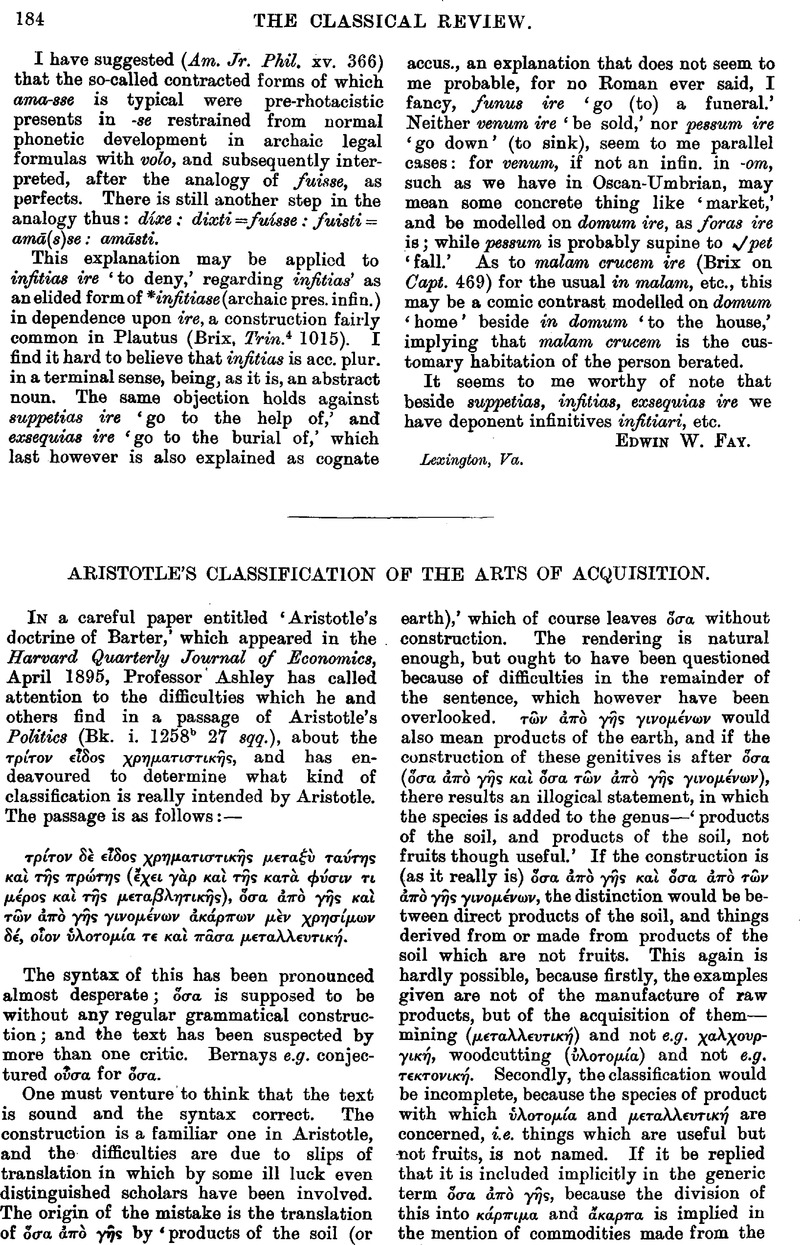No CrossRef data available.
Published online by Cambridge University Press: 27 October 2009

page 187 note 1 The ![]() may seem an obvious exception, but yet Aristotle in a context where he is speaking expressly of this kind of life as well as of the others, says that in all of them the κτῆσις, which is τρεΦ, is ὑπ' αὑτς τςσεως δεδ∘μνμ (already quoted).
may seem an obvious exception, but yet Aristotle in a context where he is speaking expressly of this kind of life as well as of the others, says that in all of them the κτῆσις, which is τρεΦ, is ὑπ' αὑτς τςσεως δεδ∘μνμ (already quoted).
page 187 note 2 In 1257a 17, τς ναγκαας χρηματιστικς probably refers not only to the good μεταβλητικ but to the whole of the first kind of χρηματιςτικ, as it certainly does in 1258a 40.
page 188 note 1 It may be here noted that a lacuna has been erroneously assumed in the first part of the passage by Conring and others—
1259a 37.  .
.
The lacuna is supposed to be after γαμικ.
After writing or dictating the clause in which the three kinds of ∘ἰκ∘ν∘μικ are recapitulated, it seems to occur to Aristotle that, the rule in the first kind being of slaves, while the rule in both the second and third is over the free, the distinction between the two last kinds needs justification, i.e. it needs to be shown that there are really three kinds and not two, and so he adds what is in effect a parenthesis, γρ γυναικóς, &c. The sense is ‘Whereas there were, as we saw, three kinds of ∘ἰκ∘ν∘μικ, the first the management of slaves, the second that of children, the third that of a wife—[now there really are three] for, as we said, though the last two are alike in the fact that the rule in both is over the free, the nature of the rule is different in each case; in the one case it is a constitutional rule and the other monarchical.’ The emphasis is thus upon the words ∘ὐ τóν αὐτóν δτρóπ∘ν τςρχς. One of the commentators supposes so large a gap in the text before κα γρ that the English equivalent of what he thinks lost would occupy about twenty-four lines of a column of this Journal. Victorius says: ‘statim autem causam affert, cur distinxerit copulam patris ac liberorum a copula viri et uxoris; docet enim illa imperia diversa esse,’ and so doubtless took the passage as above suggested. Yet a commentator who quotes him does not seem to see that this was his meaning, and supposes that Aristotle's object in distinguishing the rule in πατρικ from that in γαμικ was to show ‘that the two latter relations represent a higher kind of rule (π∘λιτικ or βασιλικ) than the former [i.e. δεσποτικ], the result being that ∘ἰκ∘ν∘μικ,’ is more concerned with πατρ7iota;κ and γαμικ than with δεστ∘ικ,’ whereas Aristotle's object is simply to justify making three divisions of ∘ἰκ∘ν∘μικ instead of two.